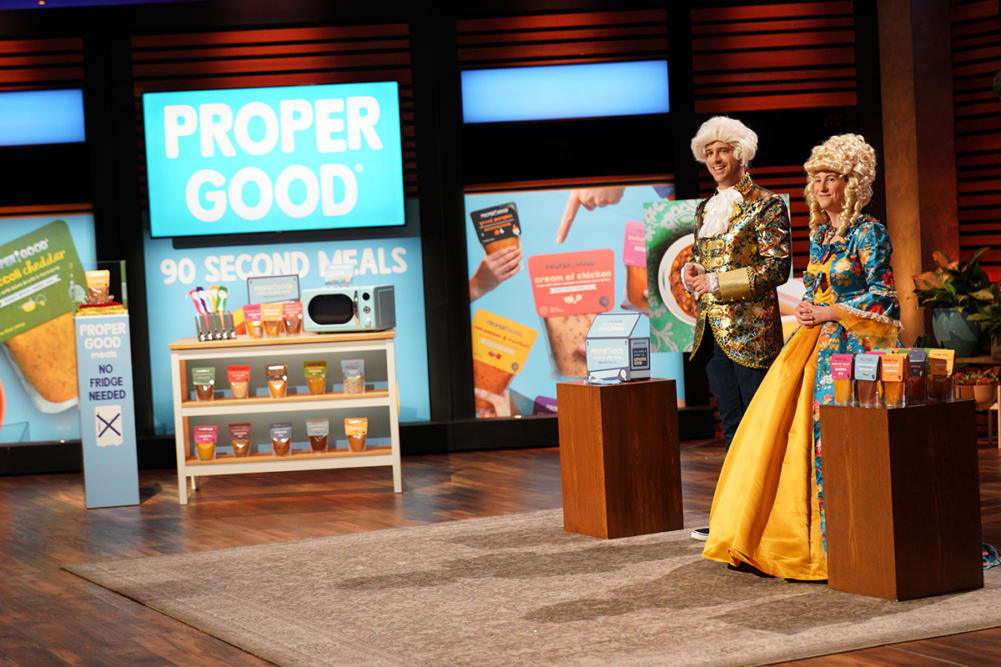AUSTIN, TEXAS — Packaged soup has lacked meaningful innovation in recent decades, according to the founders of Austin, Texas-based startup Proper Good. Christopher Jane, who launched the brand last year with his sister, Jennifer, aspires to build a “modern Campbell’s.”
Proper Good offers a line of shelf-stable meals packaged in transparent pouches that are flexible and microwave-safe. The products are primarily sold on the brand’s website, eatpropergood.com, and shipped with minimal packaging and no insulation or dry ice, unlike most other direct-to-consumer meal companies, Mr. Jane said.
Offerings are positioned around specific dietary needs, including plant-based, gluten-free, dairy-free and ketogenic. Soups include meatball minestrone, chicken and mushroom, chicken and vegetable, spiced pumpkin, cream of chicken, red pepper and meatball, chicken noodle, butternut squash, broccoli cheddar, split pea and kale, and southwest chili with plant-based ground beef. The company also offers a quinoa and brown rice blend, chicken bone broth and beef bone broth.
“We started with soups as a proof of concept,” Mr. Jane said. “We had the vision to do things like breakfast, lunch and dinner, but initially we wanted to prove the brand, the pack, the price, this whole concept of a premium, shelf-stable meal.”
Recently, the brand added a range of Proper Good Ready Oatmeal in original, blueberry coconut, apple cinnamon and chocolate, peanut butter and banana.
“You can pop it in your bag, you can take it to work, you can take it while traveling,” Mr. Jane said of the entire line. “Zero prep, it’s ready in 90 seconds, you can eat it cold even if you want to, and it covers truly a wide variety of lifestyles while having an ingredient list that reads as if you made it yourself.”
Previously the Jane siblings, who hail from the south coast of England, co-founded and led Montana Mex, a condiment brand sold in thousands of grocery retailers. Mr. Jane stepped down as chief executive officer to attend business school at Stanford University. While there, inspiration struck for his current venture.
“Proper Good came about from a personal need,” he said. “I was doing keto, plant-based, and I found there was an abundance of snacks and beverages, but when it came to meals, I was still cooking from scratch… I explored the market and realized it’s a thing. When you’re keto, plant-based, gluten-free, dairy-free or low-sodium, making 90-second meals is either nonexistent or extremely expensive with frozen or refrigeration usually.”
An appearance on “Shark Tank” in mid-October propelled sales. Donning Victorian-era garb and wigs, the pair presented Proper Good to the panel investors and accepted a deal from Mark Cuban, who offered $400,000 in exchange for a 20% stake, valuing the business at $2 million. During the program, the founders said the brand had generated over $500,000 in sales in its first full year on the market and had year-to-date sales surpassing $1 million.
“We knew we had mass appeal, and ‘Shark Tank’ had a national footprint in terms of household penetration,” Mr. Jane said. “It eclipsed our wildest projections. We did four months of average sales in a one-week period.”
The company offers discounts to medical professionals and truck drivers, who often are seeking easier, more nutritious meal options, he said. Additionally, Proper Good donates a meal to a food bank for each consumer social media post tagging the brand.
Based on consumer feedback, the company launches new products every six weeks and refines core products regularly.
“In traditional retail you don’t get a lot of data other than store sales, and you certainly have no feedback loops with consumers,” Mr. Jane said. “We have 5,000-plus reviews now and a private Slack channel with VIP customers where we can truly get real-time feedback, and if there’s enough critical mass on that feedback within a month the product is truly updated and launched.
“Our broccoli cheddar, for example, we iterated on that four times so now we think it’s the best it can be to take to retail. It really is as consumer-led as it could possibly be.”





